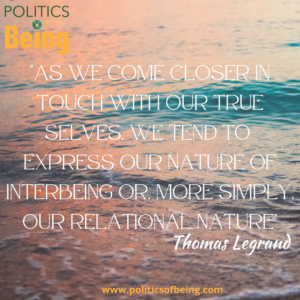
What would the development of truly mature human beings result in at the social level?
An excerpt from the book chapter: Being as the New Paradigm
“The many scientifically demonstrated effects of meditation inform us of the changes in attitudes and behaviors inner development can help promote (see chapter 9). We may also consider the testimonies of the most spiritually advanced people that have walked this earth to clearly understand the direction that spiritual development entails. In fact, according to Wayne Teasdale (1945–2004), an American Catholic monk, the great mystics of all spiritual traditions have basically shared a common divine experience: that of unity or oneness with all that is.
“Only by admitting and realizing our unity with others can we entirely fulfill our true self-being,” said Sri Aurobindo. This can be conceptualized differently, such as through the Buddhist conception of “interbeing,” but these traditions all express a dissolution of the distinction between self and others (in other words, “ego”), which naturally leads to the highest purpose: that of service. While only exceptional individuals are able to undergo this full transformation, it can certainly inform us about our nature. As we come closer in touch with our true selves, we tend to express our nature of interbeing or, more simply, our relational nature: we also get closer to and take more care of other human and nonhuman beings. We naturally develop pro-social behaviors and a sense of service (chapter 6).
This path of inner development leads us to nourish three essential connections: to ourselves, to other human beings, and to nonhuman beings. As they reflect our true nature, these connections tend to develop together, each one leading to the others. As more mature human beings, we are becoming more aware of our true needs, which are, to a large extent, relational. This tends to lead us to take more care of our partners, family, and friends, and maybe even reconcile ourselves with a brother or cousin we have not seen for a while. We grow aware of the many benefits and wisdoms that nature offers us freely, and become more sensitized to the need to protect it. We learn to take care of ourselves; we become happier and feel better, often while consuming less and finding more time for what really counts. We may decide to change our job for one that is more meaningful to us and which is in line with our values, to make our own little contribution to a better world.
As we grow wiser, we develop the ability to see things as they are, to make better and more conscious decisions that can help translate our care for one another and the Earth into effective actions. We also become more creative and open to change, more resilient. Of course, on our path, we tend to be more in touch with our own suffering and that of others, but we realize these knots and tensions have always been there, and we can learn and develop the confidence to transform them.”
